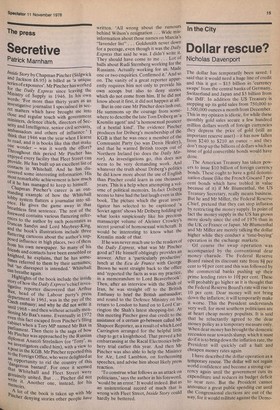The press
Secretive
Patrick M arn ham
Inside Story by Chapman Pincher (Sidgwick and Jackson £6.95) is billed as 'a unique series of exposures'. Mr Pincher has worked for the Daily Express since leaving the Ministry of Supply in 1946. In his own w. ords: 'For more than thirty years as an investigati i ve journalist I specialised n sec ret matters which have brought into Close and regular touch with government ministers, defence -chiefs, directors of Security and Intelligence, senior civil servants, ambassadors and others of influence. I think that 1946 was the year when I learnt to read, and it is books like this that make °tie wonder — was it worth the effort? Throughout this period Mr Pincher has enjoyed every facility that Fleet Street can Provide. He has built up an excellent list of contacts in Whitehall. And he has discovered some interesting information. His most remarkable achievement is how much i of t he has managed to keep to himself. Chapman Pincher's career is an outstanding example of how the Whitehall lobby system flatters a journalist into e, rice. He gives the game away in that breathless first sentence. The rest of the foreword contains various flattering references to the author by such potentates as o "can Sandys and Lord Maybray-King, and the book's illustrations include three flattering cartoons about the author's supPo, sed influence in high places, two of them jont his own newspaper. So many of his friends and contacts have been ennobled or knighted, he explains, that he has somelimes referred to them by their surnames; but `no disrespect is intended.' Whitehall can breathe again. Highlights of the book include the inside 8!orY of how the Daily Express's chief invest_igative reporter discovered that Arthur Box, head of the Labour party's press department in 1961, was in the pay of the Czech embassy; and why he did not write it nntil 1968 and then without actually mentioning Mr Bax's name. Eventually in 1972 even this fact escaped from Pincher's filing cabinet when a Tory MP named Mr Box in ,Trliament. Then there is the saga of how Pincher was approached by the Russian diplomat Anatoli Strelnikov (or 'Tony', as investigators nvestigators called him), with a view to .a Post in the KGB. Mr Pincher reported this to the Foreign Office, who were delighted at 9PPortunity to rid the country of this that bastard'. For once it seemed "'at Whitehall and Fleet Street were !entlinely united. But. . . Pincher did not Write it. Another one, instead, for his ineinoirs • _.A lot of the book is taken up with Mr Pincher denying stories other people have written. 'All wrong about the rumours behind Wilson's resignation . . Wide misinformation about those names on Marcia 's "lavender list" . . . Goldsmith never down for a peerage, even though it was the Daily Express that said he was. I didn't write it. They should have come to me , . Lot of balls about Rudi Sternberg working for the Russians. Actually working for us. Made one or two enquiries. Confirmed it.' And so on. The vanity of a great reporter apparently requires him not only to provide his own scoops but also to deny stories which do not come from him. If he did not know about it first, it did not happen at all. But in one case Mr Pincher does lash out. He summons up the courage from somewhere to describe the late Tom Driberg as 'a Kremlin agent' and 'a homosexual pouncer of a bestial kind'. The evidence Pincher produces for Driberg's membership of the KGB is that he was once a member of the Communist Party (so was Denis Healey), and that he wanted British troops out of Northern Ireland (so does the Daily Mirror). As investigations go, this does not seem to be very demanding work. And whatever the truth about Driberg's politics he did know more about the use of English than Pincher could learn in one thousand years. This is a help when attempting a volume of political memoirs. In/fact Driberg seems to have had the last laugh even in this book. The picture which the great investigator has selected to be captioned 'a Soviet agent' shows Mr Driberg holding up what looks suspiciously like his precious manuscript volume of Aleister Crowley 's secret journal Of homosexual witchcraft. It would be interesting to know what the Kremlin made of that.
If he was never much use to the readers of the Daily Express, what was Mr Pincher good at? He himself obligingly provides an answer. After a 'particularly productive lunch at the Ecu de France with George Brown he went straight back to the office and 'reported the facts as was my practice, in a memorandum to Lord Beaverbrook'. Then, after an interview with the Shah of Iran, he was straight off to the British Embassy to brief the British ambassador; and round to the Defence Ministry on his return to London to hand on to Lord Carrington the Shah's latest shopping-list. At this meeting Pincher gave due credit to the assistance of a certain go-between called Mr Shapoor Reporter, as a result of which Lord Carrington arranged for the helpful little chap to get a knighthood. That proved a bit embarrassing at the Racal Electronics bribbery trial earlier this year. And then Mr Pincher was also able to help the Minister for Air, Lord Lambton, on forthcoming speeches, and advise him about likely press reaction.
'To construe what follows as an attack on politicians,' says the author in his foreword, 'would be an error.' It would indeed. But as an unintentional record of much that is wrong with Fleet Street, Inside Story could hardly be bettered.


































 Previous page
Previous page